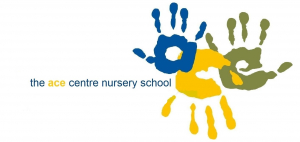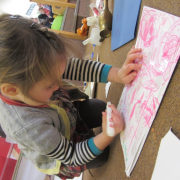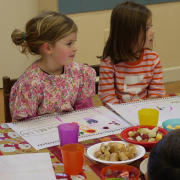Special Educational Needs & Disabilities
School Information Report for SEND Provision
About The ACE Centre Nursery School
The ACE Centre Nursery School is run on an inclusive ethos which creates a sense of community and belonging. It has a broad and balanced curriculum which all children access with the right level of support according to the individual needs of each child. Early identification of each child’s barriers to learning are key to every child progressing and developing in a safe and healthy environment. We understand that the experience we offer children will form attitudes and dispositions, not just to learning, but also to how each child feels about themselves within their school community. We provide for children with a wide range of special educational needs including those with:
- Communication and interaction needs; this includes children who have speech, language and communication difficulties, including autistic spectrum conditions.
- Cognition and learning needs: this includes children who have learning difficulties and specific difficulties like dyslexia, dyspraxia and dyscalculia.
- Social, emotional and mental health needs
- Sensory and/or physical needs; this includes children who have visual or hearing needs, a physical disability that affects their learning, or a difficulty with processing one or more types of sensory information.
Our Special Educational Needs and Disabilities Coordinator (SENCo) is Zoe Wakefield, click to send the SENCo an email. The school governor who links with the SENCo is: Catherine Hayward. She can be contacted via the Clerk to the Governors on our office email.
The Headteacher and Governors have a legal responsibility for overseeing all aspects of the SENCo’s work.
Click to review our SEND Information Report 2024-25
How do we identify and give extra help to children with SEND?
The school uses Oxfordshire County Council’s guide ‘Identifying and Supporting Special Educational Needs in Oxfordshire Schools and Settings’ and the Inclusion Development Programme – supporting children with Social, Emotional, Mental Health needs (SEMH). We use the graduated response to each child’s needs
These guidance documents set out:
- How we identify whether a child has a special educational need.
- How important it is to work together with the child’s needs at the heart of what we do; and, how we equally balance the voice of the family, child and school to achieve this.
- How we assess and track a child’s progress, using this assessment to plan and adapt our teaching and provision.
- How we support and include the child’s family at every stage of involving special services outside of the school.
- How we support targets you might wish for your child at school and at home.
- Ways in which we can adapt our learning environment to suit a child’s needs.
- How we review progress and share outcomes with you and your child
You can read this document by clicking here: Identifying and Supporting Special Educational Needs in Oxfordshire Schools and Settings.
How do we work with and support our parents and young children?
We have an understanding that all families have unique needs and require different levels of support. Our expertise in working with families is not only based upon specific training but also developed by a history of working with our Children’s Centre while it served the locality. We strive to continue this ethos by working with the local community and more recently with charitable organisations and remaining local services. Our staff understand that there is always a reason which might explain why a child is behaving or struggling in a particular way and so we have carefully developed an early intervention approach which systematically reflects on, identifies and addresses the individual needs and rights of each child in our school. We also monitor and work with families who meet the needs of an Early Help Assessment, which the SENCo will undertake and develop into a Team Around the Family where necessary.
We celebrate parents and guardians as a child’s first and most enduring educators and so work in partnership with you, stressing that you can always talk to someone, no matter how big or small your concern.
We work even more closely with children with SEND and their parents to increase our understanding, agree outcomes for your child and discuss how we can all work towards these, then review progress regularly. We do this through parent-teacher phone calls, held three times a year; SEND paperwork review meetings, when required (at least three times per year); and, support families through the process of applying for additional educational funding, including EHCP applications, and EHCP annual reviews. We also build a genuine on-going relationship with you and share information informally every day, as well as running many schemes which support you to contribute to a Nursery School session alongside the children. These schemes include: (depending on eligibility)
- Parent workshops in supporting the curriculum at home (suspended due to Covid-19 restrictions and replaced by home learning guidance and learning videos via newsletters and website.)
- Your child’s inclusion in our Early Talk Boost programme.
- A weekly newsletter to keep you up to date and involved in Nursery School life.
- Becoming a Sofa Super Hero and reading with us in sessions (suspended due to Covid-19.)
- Supporting us on any school trips we undertake. (suspended due to Covid-19.)
- Contributing to our policies on SEND and Equality and other aspects of our provision through our annual school questionnaire
- A comprehensive Early Years Pupil Premium program which includes nurture, literacy and maths home visits, a gifted home library, maths mastery and “nursery school in a box” learning packs
Adapting the curriculum
We offer a broad and balanced curriculum for all children, including those with a disability or those with SEND. You can find out more about how we adapt our curriculum through the following policies, available from our Reception office or visit the Policies page on our website.
- Teaching and Learning Policy
- SEND Policy
- Equality Policy
- Accessibility Plan
We take the view that all children have the right to have their needs met. We have found the following two observations to be true. Firstly, that many of the strategies used for supporting children and young people with SEND, benefit all children in supporting their learning as well. For example, it is the case that one child’s right to use a visual prop to support their communication and language might equally increase her neighbours’ ability to focus and pay attention. Secondly, universally providing for diverse needs, rights and cultures teaches children how to appreciate and celebrate their differences, while also learning how we essentially share the right to be safe, supported and looked after by each other.
Specific interventions or adaptions we use to support children include:
- Early Talk Boost (communication & interaction)
- Speech and Language interventions
- Protective Behaviours (Social and Emotional aspects of learning)
- Some Makaton sign language is used by staff throughout the Nursery School, at singing and Hello times (communication & interaction, cognition and learning and also EAL children)
- Visual timetables, “now and next” cards, choice boards are used to help children think ahead and link planning to doing (supported by Boardmaker software).
- We have an understanding of universal strategies for sensory processing issues.
- Treasure Trove games and activities are used within child-led sessions to support and improve attention and listening, communication skills and language skills.
- Communication strategies used include: “match plus one”, “descriptive commentary” (with gaps), sequencing, specific praise, “observing – waiting – listening” to support sustained shared thinking, “backward chaining”.
- SCERTS visual support system for communication
What Expertise can we offer?
The ACE Centre Nursery School is an inclusive school and has worked successfully with children who have had a wide range of SEN and Disabilities. At our core, we value all children’s right to access education in the way that suits them best. All aspects of our provision demonstrate this; in the way we set up the learning environment; the individual planning and focus that we give to each child; and, in respectful relationships, based on observing needs, sharing and sustaining attention, listening and responding with just the right level of interaction. Our ethos is to support and maximise a child’s well-being and involvement in the experiences they have at school and in order to do this we are trained to identify and understand barriers to learning. Through many different approaches we skilfully adapt our provision to fit the child.
Staff training is undertaken in various aspects of SEND, according to the needs of the children, to ensure that our provision and that the support given to children is appropriate and effective. The training needs of our practitioners are reviewed as part of our performance management and school development processes and we have adopted an inclusive range of core concepts, based on research and best practice, in which staff receive regular inhouse training throughout the year.
Staff have particular expertise in working with children with SEND and in supporting children who are delayed in their speech and language development. In addition, staff have undergone training in an intervention program called “Early Talk Boost” and we also use some Makaton signing. We have undertaken whole-team training in: “Emotion Coaching”, “Protective Behaviours”, “The Quiet Child”, “Spontaneous Planning”, “Risk and Challenge in the Early Years” and “Interacting or Interfering: Improving Interactions in the Early Years”. These programmes have been delivered during INSET days and partnership training days organised by our own Teaching School over many years and including the 2020-2021 academic year. We have worked to embed these concepts into our practice to enhance our work with children who need skilled and knowledgeable practitioners who can understand and effectively support children’s challenging behaviours.
We have worked with parents and a range of professionals to secure both Education, Health and Care Plans (EHCP) and Additional Funding applications for children when necessary and supported both children and their families to make a successful transition to their next school.
We also have access to a range of specialist support services including:
- Health Services – including Health Visitors and Occupational Therapists. The team liaises closely with the Speech and Language Therapist who regularly offers appointments and clinics at the ACE Centre.
- Services to support learning – such as Oxfordshire’s School Inclusion Team, the Early Intervention Service, Early Years Special Educational Needs Toolkit and the Educational Psychology Service.
Information about these services, and others, as well as what they offer, can be found on the Oxfordshire County Council SEND pages, where you will also see links to Independent Parental Support for SEN and Disabilities in Oxfordshire https://www.oxfordshire.gov.uk/cms/public-site/support-services-send
How do we know if SEND Provision is effective?
The progress of all children is tracked throughout the school through the use of “All About Me” learning portfolios and Early Years Child Development Profiles. The accuracy of assessment for children with high level special needs is strengthened by our use of the Department for Education’s Early Years Developmental Journal. Key persons update their group’s profiles throughout the year and pass on their assessment data three times (with additional entry data for new children) across the year, so that we can monitor and track the progress and achievement of all our pupils. This data is also analysed to ensure that any support or interventions needed are offered promptly. In addition, key persons use their knowledge of their key children from observations in both adult-led groups and child-led learning to share any concerns, new strategies or new information with staff during our weekly team briefings.
When we run special intervention groups for children, such as Early Talk Boost, we collect and assess data from before and after the intervention and then analyse this to evaluate their effectiveness and to decide how best to run interventions in the future.
Children sometimes require more tracking and support for specific targets and strategies which the SENCO, other specialists and family have decided on together. These children and families are supported by an on-going process of meetings, targets, strategies and reviews which are recorded on SEND support paperwork and more detailed tracking through each child’s Practice Developmental Journal. Together, the All About Me portfolio, EY Child Development Profile and the SEND Support paperwork, provide a comprehensive picture and description of an individual’s strengths, interests, family’s wishes, needs and rights, successful strategies, progress and attainment. This record can be used to apply for EHCP or additional funding if necessary, and at transition time, is copied and discussed at length with the child’s next teacher, SENCo and school.
How are children with SEND helped to access activities outside of the classroom?
All children are included in activities and trips, following risk assessments where needed, and in accordance with our duties under the Equalities Act 2010. We talk to parents and children when planning trips so that everyone is clear about what will happen.
There is information about activities and events for disabled children and those with SEND in Oxfordshire in the Family Information Directory and Oxfordshire’s Accessibility Strategy
What do we do to ensure the wellbeing and involvement of children with SEND?
We carefully observe and listen to children and always seek to understand their opinion or point of view. The way in which we interact with children may take different forms, depending on their age and stage of development. For example, where a child may not be able to verbally contribute to discussions, we can use written and photographic observations of their interests, preferences, strengths, learning and development. Some children may communicate through choosing, discussion or sorting pictures or photographs.
We also recognise that behaviour is communication and we respond immediately by identifying and accepting feelings first, then reasserting boundaries and ultimately fixing problems or planning what to do next time. This system of Emotion Coaching is embedded in our practice for all children and leads the children creating their own caring and supportive community.
We use Ferre Laevers’ Well-being and Involvement monitoring regularly and have also added “Sustained Shared Thinking and Emotional Well-being” (SSTEW scales) to the range of monitoring tools we use to reflect on our practice and provision.
We expect, model and support all children to behave respectfully towards others within the Nursery School and do not tolerate any unkind or hurtful behaviour. We actively teach Protective Behaviours to the children and help them learn they have the right to feel safe all of the time, how to recognise when they don’t and what they can do to rectify this. For more information please see our Behaviour Policy.
How do we help children with SEND to join the school and make the transition to their next educative setting?
We carry out Home Visits prior to all children starting Nursery School. As part of this visit your child’s Key Person is able to discuss each child’s individual needs, including any Special Educational Needs and Rights or Disabilities.
All children must visit the Nursery School at least once with their parent(s)/ guardian(s) prior to starting. This visit will be arranged either at a New Parents Meeting in the term before your child starts at Nursery School or via the Office Staff in Reception. We encourage parents to visit more than once if they feel this necessary for settling their child, supporting families to feel happy and secure.
When a child with SEN or a disability is moving on to their next school or setting we:
- Support parents in visiting schools and understanding what choices are available to them.
- Liaise with the receiving school’s headteacher, SENCO, teacher and teaching assistant, as appropriate.
- Arrange extra school visits prior to entry, supported by Nursery School staff if necessary.
- Offer the opportunity for receiving staff to visit the child in Nursery School.
- Provide assessment and records for the receiving school.
- Review the child’s Education, Health and Care Plan and SEND records as appropriate – inviting the receiving school to attend the final review meeting before the child’s transfer.
Who to contact
If a parent or guardian is concerned about SEND provision for their child, initial contact should be made with the key person. A meeting will be arranged, which would include the SENCo, to discuss the concern. Parents can request an appointment with our Headteacher directly. The Parent Partnership Service is available to support parents in meetings concerning their child’s progress and welfare.
In the event of a formal complaint concerning SEND provision, parents/guardians are advised to contact the Headteacher and follow the Oxfordshire LA procedure in the first instance. Parents may also contact the Governing Body.
If you would like impartial advice from Oxfordshire’s SENDIASS (SEN and Disability Information, Advice and Support Service) you can find them here:
SENDIASS Information and Support for Parents and Children
If you would like to know more about opportunities for children and young people with SEND and their families, support groups or information about SEND these are listed in the Family Information Directory.
Oxfordshire’s Local Offer contains lots of information for parents: SEND Local Offer information


